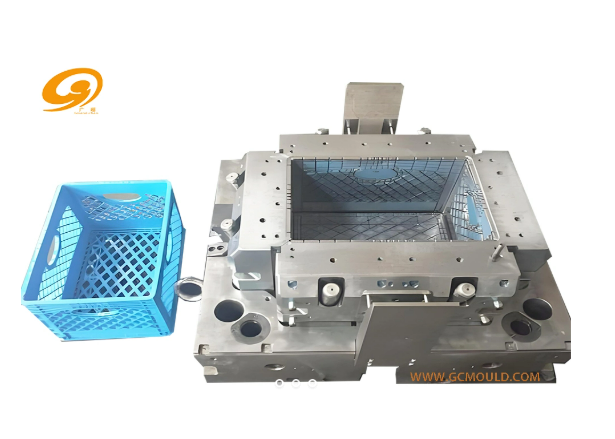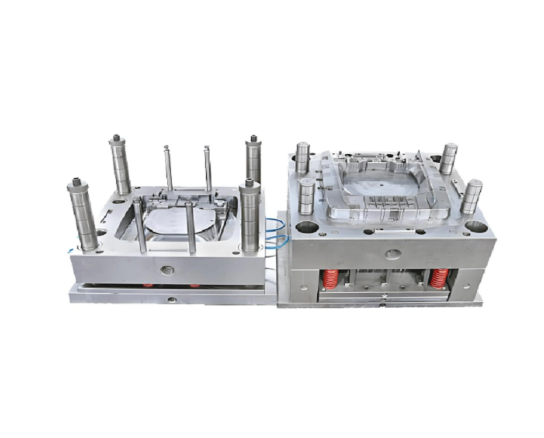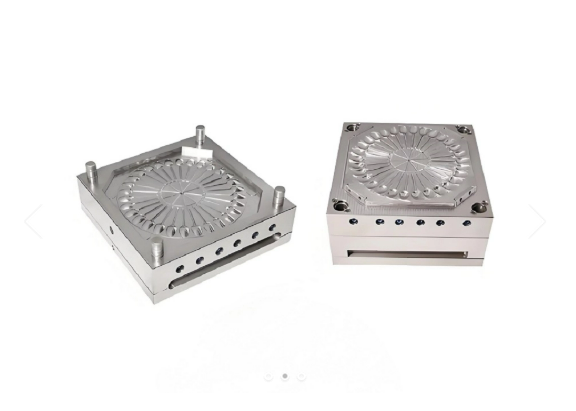Views: 0 Author: Site Editor Publish Time: 2025-03-21 Origin: Site











The manufacturing industry has witnessed significant advancements over the past few decades, particularly in the realm of injection molding. Among the various products enabled by this technology, the plastic basket mould stands out for its versatility and efficiency in producing everyday commodities. This article delves into the myriad benefits of using plastic basket moulds, exploring their impact on production efficiency, product quality, and market competitiveness. By understanding the intricacies of precision commodity molds, manufacturers can leverage these tools to optimize their operations and meet the growing demand for high-quality plastic products.
Plastic basket moulding has evolved significantly since its inception, transitioning from rudimentary techniques to sophisticated processes that incorporate advanced technology and materials. The integration of Precision Commodity Molds has been pivotal in this evolution. These molds allow for the creation of complex designs with high accuracy, catering to a wide range of applications from Commodity items to industrial components.
The advancements in mould design and manufacturing have been driven by the need for efficiency and precision. Modern molds are engineered using computer-aided design (CAD) and computer-aided manufacturing (CAM) technologies, enabling manufacturers to create detailed and intricate basket designs that meet specific customer requirements. This precision in design translates to consistency in production, ensuring that each plastic basket produced meets the exact specifications necessary for its intended use.

The integration of advanced technologies such as 3D printing and CNC machining has revolutionized mould design. These technologies facilitate rapid prototyping and precise machining of mould components, reducing lead times and enhancing the quality of the final product. For instance, the utilization of high-speed CNC milling allows for the creation of complex geometries with tight tolerances, a critical factor in producing high-quality plastic baskets.
Moreover, the adoption of innovative materials in mould construction has improved durability and lifespan. Moulds made from hardened steel or aluminum alloys not only withstand the rigors of high-volume production but also maintain their precision over extended periods. This longevity is essential for manufacturers aiming to optimize their return on investment in mould tooling.
The use of plastic basket moulds offers numerous advantages that enhance manufacturing efficiency and product quality. These benefits are multifaceted, impacting various aspects of production and contributing to competitive advantages in the marketplace.
Plastic basket moulds enable high-speed production due to their customized design and precision engineering. The moulds are optimized for rapid injection cycles, allowing manufacturers to produce large quantities of baskets in a shorter time frame. This efficiency reduces production costs and meets the high demand for plastic baskets in various industries.
Furthermore, the streamlined production process minimizes material waste, as the precision of the mould reduces the likelihood of defects and rejects. This efficiency not only conserves resources but also contributes to environmental sustainability by minimizing plastic waste.
The precision of commodity molds ensures that each plastic basket produced meets exact specifications, resulting in uniformity and consistency across production runs. This uniformity is crucial for products that require precise dimensions and structural integrity, such as storage baskets used in retail or logistics.
In addition, high-quality moulds contribute to the aesthetic appeal of the final product. Smooth finishes and detailed designs are achievable due to the meticulous craftsmanship involved in mould production. This attention to detail enhances the marketability of plastic baskets, making them more attractive to consumers.

Plastic basket moulds offer significant flexibility in design, allowing manufacturers to cater to specific customer needs and market trends. The ability to customize shapes, sizes, and features enables the production of a diverse range of baskets suitable for various applications.
For example, inserts and multi-cavity moulds can be utilized to produce baskets with unique functionalities or decorative elements. This customization is essential in industries where product differentiation is key to gaining a competitive edge.
While the initial investment in high-quality plastic basket moulds may be substantial, the long-term benefits outweigh the costs. Durable moulds designed for longevity reduce the need for frequent replacements, resulting in cost savings over time. Additionally, the efficiency gained through reduced cycle times and minimized defects contributes to lower operational costs.
Manufacturers can also achieve economies of scale by producing large volumes of baskets without compromising on quality. This scalability is critical for meeting market demands and maximizing profitability.
Precision commodity molds play a vital role in ensuring the quality and reliability of plastic baskets. They are engineered to exact specifications, which is essential for producing components that meet stringent quality standards. The precision in mould design directly impacts the consistency and performance of the final product.
Implementing rigorous quality control measures during the mould manufacturing process is crucial. Manufacturers like GuangChao Mould adhere to international quality certifications and standards, such as ISO 9001, to ensure that their moulds meet industry requirements. This commitment to quality assurance fosters trust with clients and enhances the reputation of the manufacturer in the global market.
Advancements in technology have introduced sophisticated quality control techniques. Non-destructive testing methods, such as ultrasonic testing and 3D scanning, are used to detect imperfections in the moulds. These technologies ensure that any deviations from the design specifications are identified and rectified before the mould enters mass production.
Moreover, real-time monitoring systems can be integrated into the production process to continuously assess the quality of the plastic baskets being produced. This proactive approach to quality management minimizes the risk of defects and enhances overall production efficiency.

GuangChao Mould, established in 2003, exemplifies the benefits of using advanced plastic basket moulds. With over 20 years of expertise, the company has become a leader in precision commodity molds. Their commitment to innovation, quality, and customer service has propelled them to the forefront of the industry.
The company's extensive use of advanced machinery, including high-speed CNC milling and injection molding machines ranging from 168T to 1300T, showcases their dedication to technological advancement. Their skilled team, averaging eight years of experience, supports OEM and ODM services, ensuring that client needs are met with precision and efficiency.
GuangChao Mould has successfully expanded its business network to the Middle East, Mexico, Russia, and beyond. Their ability to understand and adapt to the needs and norms of different markets has been instrumental in their international success. By actively exploring global markets and customizing their products and services accordingly, they have secured a strong market share and established long-term cooperative relations with clients worldwide.
The company's innovative corporate culture encourages employees to propose creative ideas and solutions. This flexibility allows GuangChao Mould to quickly respond to market changes and customer needs, adjusting product designs and production processes as necessary. Their investment in research and development drives technological innovation, maintaining their competitive edge in the industry.
Plastic basket moulds find applications across a multitude of industries due to their adaptability and efficiency. From Commodity items to industrial storage solutions, the demand for high-quality plastic baskets continues to grow.
In the consumer market, plastic baskets are essential for organizing and storing Commodity items. Manufacturers utilize precision moulds to produce baskets that are durable, aesthetically pleasing, and functional. The ability to produce various designs and colors enhances the appeal to consumers seeking products that match their home decor and personal preferences.
Additionally, the incorporation of ergonomic features, such as comfortable handles and stackable designs, is made possible through advanced moulding techniques. These features improve the user experience and increase the value proposition of the products.
In industrial settings, plastic baskets are used for storage, transportation, and organization of parts and materials. The robustness and consistency provided by precision moulds are crucial for products used in demanding environments. Manufacturers can produce heavy-duty baskets capable of withstanding substantial weight and harsh conditions, ensuring reliability and safety in industrial operations.
Moreover, the ability to produce baskets with specific dimensions and features allows businesses to optimize their storage solutions and streamline operational workflows.
The plastic moulding industry is continuously evolving, with emerging trends poised to shape its future. Sustainability, technological innovation, and customization are at the forefront of these developments.
Environmental concerns are driving the adoption of sustainable materials in plastic moulding. Biodegradable plastics and recycled materials are becoming more prevalent, and mould manufacturers are adapting their processes to accommodate these materials. This shift not only addresses environmental issues but also meets consumer demands for eco-friendly products.
Manufacturers are also implementing energy-efficient production methods and reducing waste through optimized mould designs and production techniques. These practices contribute to sustainable manufacturing and align with global efforts to reduce the environmental impact of industrial activities.
The integration of Industry 4.0 technologies, such as the Internet of Things (IoT) and artificial intelligence (AI), is enhancing the capabilities of mould manufacturing. Smart factories enable real-time monitoring and data analysis, improving efficiency and predictive maintenance. Moulds equipped with sensors can provide valuable feedback on performance and wear, allowing for timely maintenance and extending the mould's lifespan.
AI-driven design optimization can lead to more efficient mould designs, reducing material usage and production time. This technological advancement fosters innovation and positions manufacturers to meet future challenges proactively.
The benefits of using plastic basket moulds are extensive, impacting efficiency, quality, customization, and cost-effectiveness in manufacturing. Precision commodity molds play a critical role in producing high-quality plastic baskets that meet the evolving needs of various industries. Manufacturers like GuangChao Mould exemplify excellence in this field, leveraging advanced technologies and innovative practices to deliver superior products.
As the industry continues to evolve, embracing sustainability and technological innovation will be essential. By utilizing advanced plastic basket moulds and adapting to future trends, manufacturers can enhance their competitiveness and contribute to a more efficient and sustainable manufacturing landscape.
